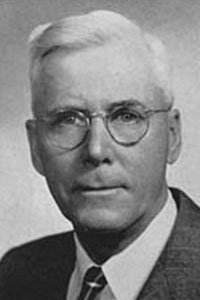
Eminent Farmer
County: Bon Homme
Sampson C. Thomas was born Oct. 30, 1891, on the old Thomas homestead just two miles west of his present home. Young Thomas finished eighth grade in the Equal Rights rural school and attended Springfield State Normal for three years. After working with his father on the farm until he was 21-years-old, he married Ladie E. Boyd in 1913. They reared three boys and two girls. In March 1914, they moved to their present home, renting from Sampson's father for three years and then buying the 120 acres about three miles west of Springfield. The original 120 acres now have been expanded to 600 acres and are farmed in partnership with a son. Thomas has been raising purebred Poland China hogs for 30 years. Other livestock on the farm include commercial cows and heifers, with a purebred Polled Hereford bull. He grows alfalfa and sweet clover in rotation with other crops for feed and as a means of maintaining his soil's productivity. Thomas was the first county chairman of the Wheat Allotment and Corn-Hog programs in 1935. He held this job with the AAA and later the production and marketing administration for nine years. He has been treasurer of the Niles school district (No. 39) for 33 years. He was president of the Bon Homme County Farm Bureau for 10 years and on the state board of directors for three years. He has been chairman of the county Crop Improvement association for five years, and was a member of the state Livestock committee. In 1946, he helped organize the local unit of the Rural Electrification association; he was a 4-H club leader for six years. For 20 years he has been an active member of the Athenian Debating society in Springfield. He also has maintained active membership in the state Poland China association. For 20 years he was superintendent of the Sunday school in Springfield. He still teaches his Sunday school class at the Springfield Congregational Church and has served as both deacon and trustee. In 1935, he was presented with the state Farm Bureau Distinguished Service Award and in 1946, he received the Skelly Farm Award for Superior Achievement in Agriculture.

